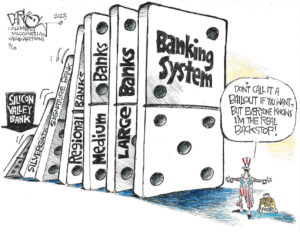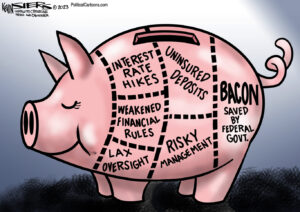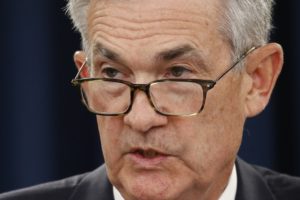How McCain’s Grandstanding Sidelined the Bailout Deal
John McCain's sudden intervention in Washington's deliberations over the Wall Street bailout could not have been more out of sync with what was actually happening.John McCain’s sudden intervention in Washington’s deliberations over the Wall Street bailout could not have been more out of sync with what was actually happening.
He lamented that “partisan divisions in Washington have prevented us from addressing our national challenges.” But for days, bipartisanship has been the rule in this argument.
Republicans and Democrats alike were highly critical of President Bush’s proposal to inject $700 billion into the financial system. Yet leaders of both parties were trying hard to negotiate an agreement with Treasury Secretary Henry Paulson. That’s why they were close to an agreement in principle even before the two presidential candidates arrived Thursday for the White House meeting that McCain thought was so important.
House Speaker Nancy Pelosi and Minority Leader John Boehner normally fight about everything. But on Wednesday they issued a joint statement noting that “working in a bipartisan manner, we have made progress,” even if Boehner was having trouble delivering his party’s votes.
And if McCain had been following the negotiations closely, he would have known that at times this week Senate Democrats worried that Rep. Barney Frank, D-Mass., the chairman of the House Financial Services Committee, was too eager for a deal.
Frank did not need McCain to make him bipartisan, and he grumbled that Thursday afternoon’s White House gathering was a mere “photo op.” Senate Banking Committee Chairman Chris Dodd, D-Conn., called it “political theater” that may have stalled the final agreement.
President Bush himself was uncharacteristically forthcoming with concessions. In his address to the nation, he said he wanted to “ensure that taxpayers are protected.” That meant he had acceded to Democratic demands that the government get shares in the companies it rescues. He endorsed oversight mechanisms his administration’s original proposal lacked. He accepted an idea his negotiators had resisted fiercely: limiting what the financial titans who got us into this mess could pocket from this enormous package.
If you doubt that McCain’s moves were about rescuing his candidacy rather than our economy, consider how his proposal to suspend the presidential campaign came about.
McCain had just gotten off a phone call with Obama on Wednesday in which they discussed a joint statement of principles and McCain broached the idea of suspending the campaign. Obama said he’d think about it, but McCain didn’t give him time. To Obama’s surprise, McCain appeared on television shortly after the conversation to announce his unilateral pause in campaigning and a call for postponing Friday’s debate. This is bipartisanship?
As for getting the presidential candidates to Thursday’s White House meeting, Bush’s lieutenants had been in discussions with McCain’s people during the day on Wednesday. Obama didn’t get his invitation from the president until around 7:30 p.m., just an hour and a half before Bush’s speech. This was an active intervention by Bush on behalf of McCain to box Obama into the photo op. Again, was this bipartisan?
The simple truth is that Washington is petrified about this crisis and will pass something. There are dark fears floating through the city that foreign investors, particularly the Chinese, might begin to pull their billions out of our system.
Scarier than the bad mortgages are those unregulated credit default swaps that the financier George Soros has been warning about. There are $45 trillion of those esoteric instruments sloshing around the global financial system. They were invented as a hedge against defaults on debts, but even the financial smart guys don’t fully understand their impact or how to price their real value.
Fear is a terrible motivator for careful legislating, but it’s a heck of a way to bring about a lot of bipartisanship. McCain jumped into this game in the fourth quarter. Many of the players on the field, caked in mud and exhausted but determined as they approach the goal line, wonder why this new would-be quarterback has suddenly appeared in their midst.
McCain could yet play a constructive role by rounding up votes from restive Republicans, particularly in the House. Oddly, the biggest obstacle to a bill may not be Democrats, but Republicans who refuse to go along with their own president. And — yes, there is an election coming — Democrats will be wary of going forward unless a substantial number of Republicans join them.
But McCain’s boisterous intervention — and particularly his grandstanding on the debate — was less a presidential act than the tactical ploy of a man worried that his chances of becoming president might be slipping away.
E.J. Dionne’s e-mail address is postchat(at)aol.com.
© 2008, Washington Post Writers Group
Your support matters…Independent journalism is under threat and overshadowed by heavily funded mainstream media.
You can help level the playing field. Become a member.
Your tax-deductible contribution keeps us digging beneath the headlines to give you thought-provoking, investigative reporting and analysis that unearths what's really happening- without compromise.
Give today to support our courageous, independent journalists.




You need to be a supporter to comment.
There are currently no responses to this article.
Be the first to respond.